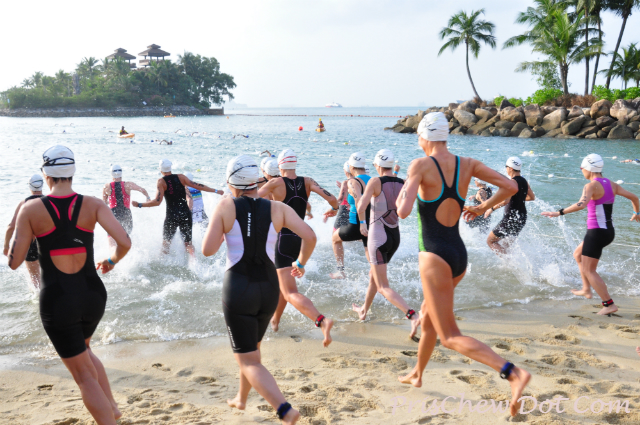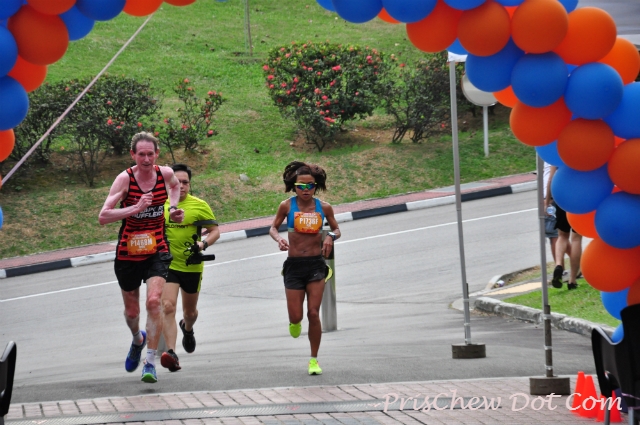Cardiac arrest cases while running are becoming more commonly reported in the media.
Last Sunday, at the Standard Chartered Hong Kong Marathon, a 52 year old female runner collapsed and passed away upon completing the 10km race. And closer to home, a 29 year old male runner lost his life at the Standard Chartered Marathon Singapore, about 100 metres from the finishing line last December.

Running is becoming an increasingly popular physical past-time.
Causes of cardiac arrest in runners
What typically causes cardiac arrest cases in runners? Said Dr Lee Yian Ping, consultant cardiologist at the Raffles Heart Centre, Raffles Hospital Singapore, “Endurance athletes such as runners may have congenital heart diseases or genetic conditions such as dilated cardiomyopathy (when the heart’s ability to pump blood is decreased because the heart’s main pumping chamber, the left ventricle, is enlarged and weakened) or hypertophic cardiomyopathy (when the heart muscle becomes abnormally thick).”

Dr Lee Yian Ping is a consultant cardiologist at the Raffles Heart Centre, Raffles Hospital Singapore.
He added, “There may also be previous heart injury from viral myocardititis (caused by a viral infection and often results in the person’s own immune system attacking the body) that was undiagnosed. The scars from previous injuries can cause dangerous heart rhythm.”
For endurance athletes, the rise in the body’s cardiac enzymes, post-race, may result in cardiac arrest. Explained the cardiologist, “Endurance sport such as marathons have been associated with the rise in cardiac enzymes post event and in some marathon runners, an MRI of the heart revealed some fibrosis (microscopic scarring of tissues).”
But this may cause problems, according to the doctor. He said, “But a large study showed no increase in mortality in marathon runners from the scarring.”
And said Dr Lee, those who do low to moderate intensity exercise (30 minutes per day or 2.5 hours per week) have an increased life span.”
Risk of cardiac arrest is relatively low
Amongst endurance athletes, Dr Lee pointed out that data given by the Ministry of Health, Singapore, had been two cases in 100,000 runners in 2007, for those under 35 years of age but then again, many of these runners may not necessary have been athletes – who would do endurance sport on a regular basis.
Dr Lee added, “The only comparative data supporting the increased risk of sudden cardiac death in athletes comes from the Padua, Italy region, in which they found that the risk of sudden cardiac death in athletes was 2.3 in 100,000 per year, and this was higher than in non-athletes (0.9 in 100,000 per year).”
Happens in people with undetected heart conditions
However even though such individuals who collapse may appear healthy, Dr Lee added that such cases only happen in people with undetected heart conditions. He said, “They only happen in individuals with underlying undiagnosed cardiac conditions. But these people may appear normal and asymptomatic (shows no symptoms).”

Athletes should do a screening before embarking on physical activity.
Added the cardiologist, “So before embarking on intense physical activity, athletes should do a cardiac screen, even a basic one, such as an ECG. A more elaborate heart test would be an echocardiogram.”
Dr Lee also pointed out that getting a medical opinion is not difficult, before starting out on any intense physical activity. He said, “It is not hard to get a medical opinion before embarking on endurance training. In fact, any trekking expedition teams make it mandatory for members to do a cardiac check before the expedition.”
After all it is always best to be safe rather than sorry.
Symptoms of impending cardiac arrest
Dr Lee continued, “At the same time, athletes should always warm up before doing any strenuous activity, and should they experience symptoms, they should stop immediately.”
Symptoms of an impending cardiac arrest, according to Dr Lee, include a sudden decrease in stamina for no reason, cold sweats and chest pains. And all runners, triathletes and other endurance athletes should remain vigilant for such signs when they are exercising.
Said Dr Lee, “So if runners are having chest discomfort, they should stop running and seek a medical opinion before resuming.”
What to do when a runner collapses
And if a runner suddenly collapses without reason during a race due to cardiac arrest, Dr Lee added that his or her survival rates are generally low. He said, “The survival rates are about 11 per cent, but if there is immediate intervention, for example, a defibrillator nearby, that can shock patient’s heart back to the normal rhythm”, the rates are improved.

What should you do when runners may collapse during a race?
Dr Lee said, “So when fellow athletes see their peers collapse, they should call for an ambulance immediately. If the patient is not breathing and has no pulse, then they must start CPR (cardiopulmonary resuscitation).”
“After all, education and awareness is the key to prevention,” he continued.

Hi, I am a student currently doing a project relating to your post. May I know where did you obtain this source from?
This was a personal interview that I did with the doctor quoted in the article.